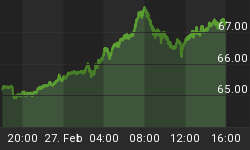"All is waves, with nothing waving, over no distance at all."
That’s a famous line in a fantasy duology describing the basics of magic. Interestingly, it also aptly describes quantum mechanics to a tee. In the rarefied world of quantum physics, the magic of quantum computing lies in incredibly powerful yet bizarre--and even slightly grotesque--machines which look more like a steampunk chandelier than anything remotely computer-esque.
IBM’s Quantum Computer
Yet, this machine is the most sophisticated quantum computer ever built by man (aliens could have yet beat us to the punch).
It’s powered by a 50-qubit (quantum bit) processor that follows the knotty rules of quantum physics--i.e., the wacky behavior of sub-atomic particles that make up our universe.
That elaborate tangle of supercooled tubes and electronics could be able to solve extremely complex algorithms that the current crop of supercomputers can barely handle.
It could potentially create breakthroughs in the most complicated data processing problems, revolutionize artificial intelligence, enable the development of new molecular structures and engineered drugs as well as perform fiendish analysis well beyond the capabilities of today’s binary computers.
Who knows, it might even be able to recreate the human brain or at least reverse engineer it.
On the flipside, quantum computers could turn cryptography and cybersecurity on their heads by cracking sophisticated encryption schemes.
By now, you might have guessed that quantum computers remain very much a work in progress, with scientists and engineers still toiling in labs in a race to develop quantum computers that can significantly outperform the most powerful supercomputers.
But that has not held back early-stage investors from funding work on computing power that is still considered years away from being ready for the real world.
According to Pitchbook, venture capitalists, or VCs, have poured a record $1.02B in quantum computing companies so far this year, more than was funneled into the industry during the previous three years combined.
Blazing the Trail
IBM is just one of the players in this moonshot and esoteric industry. Microsoft, Google and Intel have been building their own quantum devices over the past few years. So are federal governments, corporations and venture capitalists who have been investing in the technology.
Lesser known startups in the space include Rigetti Computing, IonQ and PsiQuantum.
On a national scale, the EU, UK, Canada and Australia are all investing in quantum technologies.
But in the race to quantum supremacy, two nations have emerged as the early leaders: the US and China.
Of course, the tech companies mentioned here are all proudly American. IBM has a working prototype, while Google seems to be making impressive progress. Then there’s the Los Alamos National Laboratory for Quantum Information Science, where government agencies are beginning to invest.
Meanwhile, Alibaba, Tencent and Baidu are all investing heavily in the technology and starting to attract top talent.
Quantum Supremacy
Researchers laboring on the nascent technology have their work cut out for them. The current physics and engineering side is still quite messy (as you might have discerned from IBM’s device).
Current devices can only operate under ultra-low temperatures (just 10K, or 10 degrees above absolute zero) and in a vacuum no less. This limits their current applications to big labs that can provide the suitable conditions--meaning you won’t be able to order one of these processing demons from Amazon any time soon.
Further, programming a quantum computer is extremely finicky and challenging. The state-of-the-art IBM machine above can only hold the quantum state for all of 90 microseconds. That’s a record for the industry, but still too short to achieve anything noteworthy for now.
It might take a couple of years or even decades before scientists can find a way to sustain the life of qubits and come up with working quantum computers. In fact, achieving the so-called quantum supremacy, could still be a decade or more into the future.
But plenty of investors are now betting that some real-life applications will emerge a lot sooner.
PsiQuantum said last year that it plans to build a full-scale quantum computer by 2025. The startup raised a $450 million Series D in July led by BlackRock, reaching a $3.15 billion valuation. Remarkably, PsiQuantum is already producing early versions of quantum chips with the help of Global Foundries, one of the world's largest semiconductor manufacturers.
IonQ said in March that it plans to go public by merging with a SPAC at a valuation of $2 billion.
As Matt Ocko, a managing partner and co-founder of venture capital firm DCVC, has noted, companies that get there first are likely to be ‘‘very impactful but transient" because conventional computers will likely be able to catch up to quantum technology's computational power before too long. Nevertheless, the temporary advantage is likely to be very economically valuable.
















